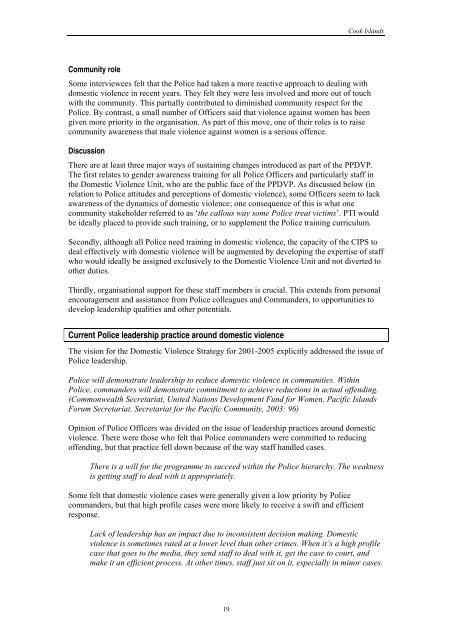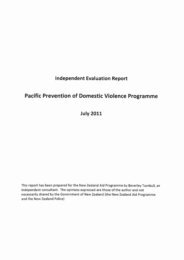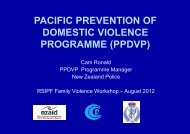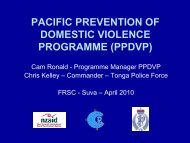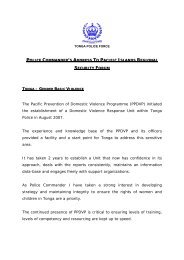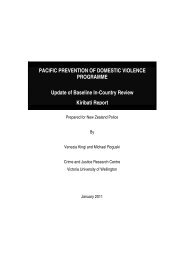Cook Islands - Pacific Prevention of Domestic Violence Programme
Cook Islands - Pacific Prevention of Domestic Violence Programme
Cook Islands - Pacific Prevention of Domestic Violence Programme
Create successful ePaper yourself
Turn your PDF publications into a flip-book with our unique Google optimized e-Paper software.
<strong>Cook</strong> <strong>Islands</strong><br />
Community role<br />
Some interviewees felt that the Police had taken a more reactive approach to dealing with<br />
domestic violence in recent years. They felt they were less involved and more out <strong>of</strong> touch<br />
with the community. This partially contributed to diminished community respect for the<br />
Police. By contrast, a small number <strong>of</strong> Officers said that violence against women has been<br />
given more priority in the organisation. As part <strong>of</strong> this move, one <strong>of</strong> their roles is to raise<br />
community awareness that male violence against women is a serious <strong>of</strong>fence.<br />
Discussion<br />
There are at least three major ways <strong>of</strong> sustaining changes introduced as part <strong>of</strong> the PPDVP.<br />
The first relates to gender awareness training for all Police Officers and particularly staff in<br />
the <strong>Domestic</strong> <strong>Violence</strong> Unit, who are the public face <strong>of</strong> the PPDVP. As discussed below (in<br />
relation to Police attitudes and perceptions <strong>of</strong> domestic violence), some Officers seem to lack<br />
awareness <strong>of</strong> the dynamics <strong>of</strong> domestic violence; one consequence <strong>of</strong> this is what one<br />
community stakeholder referred to as ‘the callous way some Police treat victims’. PTI would<br />
be ideally placed to provide such training, or to supplement the Police training curriculum.<br />
Secondly, although all Police need training in domestic violence, the capacity <strong>of</strong> the CIPS to<br />
deal effectively with domestic violence will be augmented by developing the expertise <strong>of</strong> staff<br />
who would ideally be assigned exclusively to the <strong>Domestic</strong> <strong>Violence</strong> Unit and not diverted to<br />
other duties.<br />
Thirdly, organisational support for these staff members is crucial. This extends from personal<br />
encouragement and assistance from Police colleagues and Commanders, to opportunities to<br />
develop leadership qualities and other potentials.<br />
Current Police leadership practice around domestic violence<br />
The vision for the <strong>Domestic</strong> <strong>Violence</strong> Strategy for 2001-2005 explicitly addressed the issue <strong>of</strong><br />
Police leadership.<br />
Police will demonstrate leadership to reduce domestic violence in communities. Within<br />
Police, commanders will demonstrate commitment to achieve reductions in actual <strong>of</strong>fending.<br />
(Commonwealth Secretariat, United Nations Development Fund for Women, <strong>Pacific</strong> <strong>Islands</strong><br />
Forum Secretariat, Secretariat for the <strong>Pacific</strong> Community, 2003: 96)<br />
Opinion <strong>of</strong> Police Officers was divided on the issue <strong>of</strong> leadership practices around domestic<br />
violence. There were those who felt that Police commanders were committed to reducing<br />
<strong>of</strong>fending, but that practice fell down because <strong>of</strong> the way staff handled cases.<br />
There is a will for the programme to succeed within the Police hierarchy. The weakness<br />
is getting staff to deal with it appropriately.<br />
Some felt that domestic violence cases were generally given a low priority by Police<br />
commanders, but that high pr<strong>of</strong>ile cases were more likely to receive a swift and efficient<br />
response.<br />
Lack <strong>of</strong> leadership has an impact due to inconsistent decision making. <strong>Domestic</strong><br />
violence is sometimes rated at a lower level than other crimes. When it’s a high pr<strong>of</strong>ile<br />
case that goes to the media, they send staff to deal with it, get the case to court, and<br />
make it an efficient process. At other times, staff just sit on it, especially in minor cases.<br />
19


